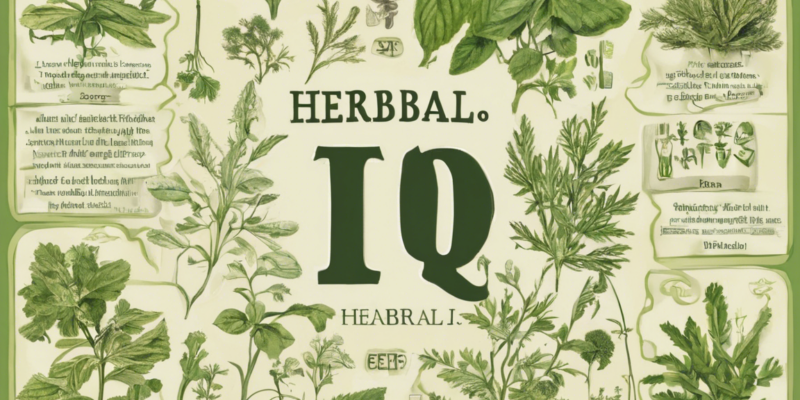Herbal medicines have been used for centuries as a natural way to promote health and well-being. These remedies, derived from plants and plant extracts, have been proven effective in treating various ailments. The world of herbal medicine is vast and diverse, with each herb offering unique properties and benefits. In this comprehensive guide, we will delve into the benefits of herbal medicine, the most popular herbs used for healing, and how you can boost your knowledge of natural remedies.
Benefits of Herbal Medicine
Herbal medicine offers a multitude of benefits, making it a popular choice for those seeking natural alternatives to conventional medicine. Here are some key benefits of incorporating herbal remedies into your wellness routine:
-
Natural Healing: Herbal medicines are derived from natural sources, making them gentle on the body and free from synthetic chemicals.
-
Cost-Effective: Herbal remedies are often more affordable than prescription medications, making them accessible to a wider range of people.
-
Holistic Approach: Herbal medicine takes a holistic approach to healing, addressing not just the symptoms but also the root cause of the ailment.
-
Fewer Side Effects: Compared to prescription medications, herbal remedies typically have fewer side effects, making them a safer option for many individuals.
-
Supports the Immune System: Many herbs have immune-boosting properties that can help strengthen the body’s natural defense mechanisms.
Popular Herbs for Healing
There are countless herbs used in herbal medicine, each with its own unique properties and healing benefits. Here are some of the most popular herbs used for healing:
1. Turmeric
- Benefits: Anti-inflammatory, antioxidant, boosts brain function.
- Uses: Used to treat arthritis, improve digestion, support heart health.
2. Ginger
- Benefits: Anti-nausea, anti-inflammatory, aids digestion.
- Uses: Eases nausea, relieves muscle pain, promotes digestion.
3. Garlic
- Benefits: Antibacterial, antiviral, immune-boosting.
- Uses: Fights infections, supports heart health, boosts immunity.
4. Echinacea
- Benefits: Boosts immune system, reduces inflammation.
- Uses: Prevents colds and flu, shortens the duration of illness.
5. Peppermint
- Benefits: Soothes digestive issues, relieves headaches, freshens breath.
- Uses: Eases indigestion, alleviates headaches, promotes oral health.
How to Boost Your Herbal IQ
To enhance your knowledge of herbal medicine and make the most of natural remedies, consider the following tips:
-
Research: Take the time to research different herbs and their benefits. Learn about how each herb can support your health and well-being.
-
Consult a Professional: If you are new to herbal medicine, consider consulting a herbalist or healthcare provider who specializes in natural remedies. They can help you create a safe and effective herbal regimen.
-
Start a Herb Garden: Grow your own herbs at home to have a fresh and convenient supply of medicinal plants. Herbs like basil, mint, and chamomile are easy to grow and have a variety of health benefits.
-
Take a Course: Consider enrolling in a course on herbal medicine to deepen your understanding of different herbs, their uses, and how to prepare them.
-
Experiment Safely: When trying out new herbs, start with small doses to see how your body reacts. Some herbs may interact with medications or have side effects, so it’s important to proceed with caution.
-
Keep a Journal: Record your experiences with different herbs, noting any changes in your symptoms or overall well-being. This can help you track what works best for you.
Frequently Asked Questions (FAQs)
1. Are herbal remedies safe to use?
- Herbal remedies can be safe when used correctly and in moderation. It’s important to research each herb and consult with a healthcare professional before starting a new herbal regimen.
2. Do herbal remedies have side effects?
- Some herbal remedies may have side effects or interact with medications. It’s important to be aware of any potential side effects and consult with a healthcare provider before using herbal remedies.
3. Can I use herbal remedies alongside prescription medications?
- It’s important to consult with a healthcare provider before using herbal remedies alongside prescription medications, as some herbs may interact with certain medications.
4. How do I know which herbs are right for me?
- The best way to determine which herbs are right for you is to consult with a herbalist or healthcare provider who can assess your individual needs and recommend specific herbs based on your health goals.
5. Can I grow my own herbs for medicinal use?
- Yes, many medicinal herbs can be grown at home in a garden or pots. Herbs like lavender, chamomile, and rosemary are popular choices for home gardens.
In conclusion, herbal medicine offers a wealth of benefits for those seeking natural ways to support their health. By familiarizing yourself with popular herbs, incorporating them into your daily routine, and following safety guidelines, you can boost your herbal IQ and harness the healing power of nature. Remember to always consult with a healthcare professional before starting any new herbal regimen to ensure safety and efficacy.

